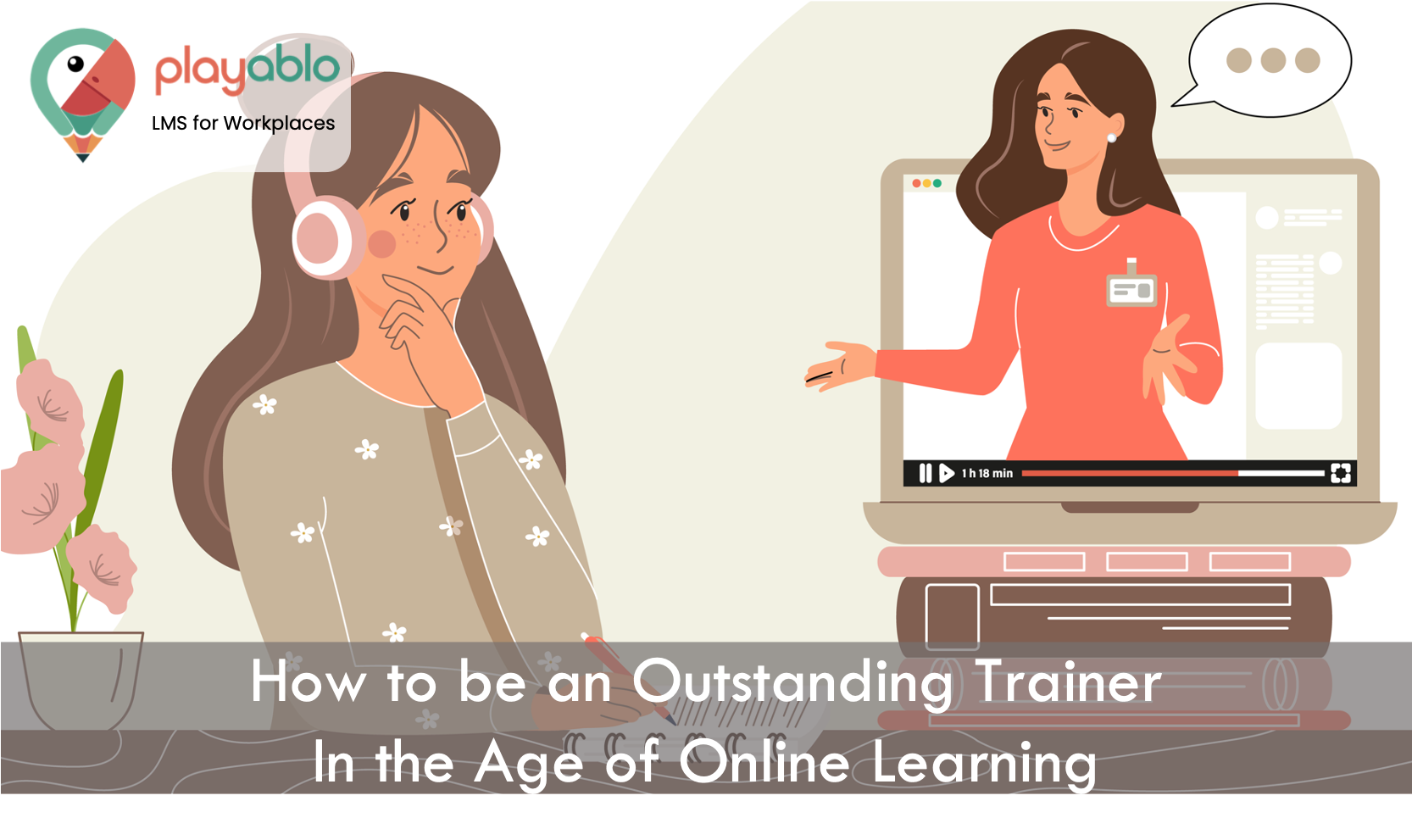Creating online training programs for a business is far from simple. On the other hand, improving your online training skills is a lot easier when you know where to begin. Perhaps a shift in mindset, training and development tools that have slipped under your radar, or more empathy will suffice. Irrespective, this is the guide you’ve been looking for — if you wish to learn how to be a remarkable online trainer in the age of digital corporate learning.
This post will help you learn about the essential training skills that trainers need to transmit knowledge and have a successful career in the online training profession. Furthermore, you’ll learn about the most remarkable training technologies that online trainers can utilize to streamline their workload and make their courses stand out.
Table of Contents
The Must-have Skills for an Online Trainer

To be effective, every trainer must possess specialized talents as well as online training and development tools. Let’s start with the following list, which comprises both soft and hard training skills.
Exceptional research abilities
Research is one of the most critical hard skills a trainer should have. Let’s talk about internet research now that it’s 2021. Internet research is both advanced and analytical. The World Wide Web offers a lot of hidden gems, some of which you’ll learn about in a minute. Start by using specific keywords in Google’s powerful search box. Add quotation marks (“ “) to search for the exact keyword or phrase and use the minus sign (-), so your search engine can avoid the search term that might be giving you erroneous results.
This form of intelligent Google searching might save you half the time it takes to uncover relevant and credible content for your training sessions. You’ll also be able to locate websites that you may not be familiar with but that have information and content that could be valuable in the long run. You must, however, examine websites and critically evaluate research papers. All you have to do to see if a website is worth your time is look through all of the menu items and look at the footer for the most recent date it was changed.
Strong communication abilities

People are the focus of online training. What distinguishes us from the rest of the living world is our ability to communicate directly. As a result, communication is one of the fundamental trainer attributes and talents you’ll need to be a successful trainer. Indeed, it has the potential to make or ruin a learner’s experience.
Consider a trainer who struggles to communicate topics. Or someone unconcerned about their students’ worries. All of these things are obstacles to learning. And the online trainer, who is in charge of online training delivery, bears accountability.
As a result, you must possess skills to listen, question, explain, and provide feedback to inspire and engage. To put it another way, you must understand how to communicate effectively in all situations. You can use these training abilities at any point in your career. As long as you know the importance of communication, the more people you train, the better communicator and online trainer you will become.
Organizing abilities
Strong organizing abilities will always get you a long way as a person and as an online trainer. You’ll be able to keep on track if you have skills like time management. Before deploying an online training program, trainers must accomplish several duties in learning, training, and development. From gathering the necessary resources to properly providing training, mastering organization is essential.
Another necessary talent for trainers is problem-solving, which they use for organizing. The truth is that the better organized you are, the more difficulties you’ll be able to solve ahead of time. Because you’ve taken care of everything ahead of time, you’ll have a great online learning experience. Plus, you’ll be less stressed.
Skills in adaptability

Things don’t always go according to plan. Life gets in the way from time to time. Delays, difficulties, and unforeseen circumstances can occur at any time. So, what are your options?
It would be best if you prepare for the unexpected as an online trainer. This preparation, of course, necessitates the ability to adjust. Have a backup plan for practically everything, and experiment with your tools to discover how some features can assist you in your preparation. Doubt yourself and consider everything that may go wrong. Now is the time to remedy it before it happens. And before you even know, your ability to adapt will turn from a skill to acquire into a personality trait.
A desire to learn throughout the rest of one’s life
A trainer should never cease learning. As a member of the training sector, you must build lifelong learning habits to stay up with all of the changes in a constantly changing market. Another incentive to invest in lifelong learning as an online trainer is to be able to sympathize with and put yourself in your students’ shoes.
When trainers create courses daily, they often lose sight of what it’s like to be learning something new. Fear, irritation, excitement, exhaustion, boredom, and a slew of other emotions run through your students’ heads. And, from time to time, you need to visualize from your learners’ point of view to be an effective trainer and create engaging and fascinating courses.
Of all these skills needed for a superstar trainer, this one gets our vote as the most important. Keep alive the itch to be a lifelong learner, so you do not forget what it’s like to be a learner.
Critical Resources for Online Training Managers

Let’s start with the most frequently requested question: What are the online training tools? All programs, platforms, and templates that assist trainers in delivering their training to their students are referred to as training tools. In truth, there are numerous training and development resources available.
Some are specifically designed for training, while others can be used to serve a variety of professions. In a nutshell, training tools are any things that assist you in doing a better job as a trainer.
The four basic types of training and development tools that every trainer should have in their toolbox are as follows:
LMS (Learning Management System)
An LMS is the most incredible training solution for instructors who wish to develop courses, manage users, and track the progress of their online training and students. Trainers should be able to do more than merely use an LMS. They should know how to get the most out of it with the least amount of effort.
PlayAblo’s LMS has a collection of pre-built online courses, allowing you to provide training on various soft skills without having to start from scratch.
Tool for creating content
To appreciate the benefits of eLearning authoring tools, you must first comprehend the definition of an authoring tool. Authoring tools are software platforms that allow trainers to incorporate various media and multimedia files into their training to make it more engaging. An eLearning authoring tool, for example, sounds like the ideal way to go if you want to create interactive courses.
There is, however, a more straightforward option. Many Learning Management Systems now have built-in authoring tools, eliminating the need to transfer platforms to deliver high-quality training. You establish an account, log in to your training hub, and start learning.
Ad: PlayAblo’s Enterprise-Grade Micro-Learning platform is built for the corporate learner. Micro-Learning, along with assessments and gamification features, ensures learning outcome measurement along with sustained engagement.
Find out more and request a custom demo!
Tools for video editing
Video editing software is one of the most underutilized training tools for trainers. Videos are compelling because they provide a vivid and exciting learning experience. Please make use of them.
It’s never been easier to make your courses more entertaining and fascinating because you can now edit an entire video on your smartphone. Experiment with different video styles to make your classes stand out. Learning how to use video tools will enhance your learners’ experience and give a personal touch to your courses, whether you’re a subject matter expert generating courses for sale or an online trainer.
Use of social media
Yes, social media is a training tool. Although it may appear strange, social media may be an efficient training and development tool. If you haven’t noticed, big social media platforms such as Twitter, Instagram, TikTok, Pinterest, Facebook, YouTube, and others are experiencing a massive uptick. This fact alone indicates that this is where your students prefer to spend their free time when they have it.
Connecting with learners on their preferred platforms as trainers is an excellent approach to tailoring the learning experience. Integrate a social networking component into your learning management system to encourage students to connect with others who have completed the same course. Also, make sure to set up Facebook groups or other social media micro-communities for your students to share ideas and engage in discussions regarding their training.
Ad: PlayAblo’s Enterprise-Grade Micro-Learning platform is built for the corporate learner. Micro-Learning, along with assessments and gamification features, ensures learning outcome measurement along with sustained engagement.
Find out more and request a custom demo!
If you want to sell your online courses, social media is a terrific way to reach out to potential students looking for the courses you’re offering. There has never been a time when the world has been more interwoven. Utilize it to your benefit.
Conclusion
That’s all there is to it, guys! To be an effective online trainer, you must develop or improve these essential training abilities and devote time to understanding and mastering the training tools listed above.
Do your homework, communicate with your students, and remember to be flexible and understanding. Experiment with several eLearning tools for trainers, and keep in mind that a good teacher is continually learning. So, what other ability or tool did we overlook? Do let us know.







Comments are closed, but trackbacks and pingbacks are open.